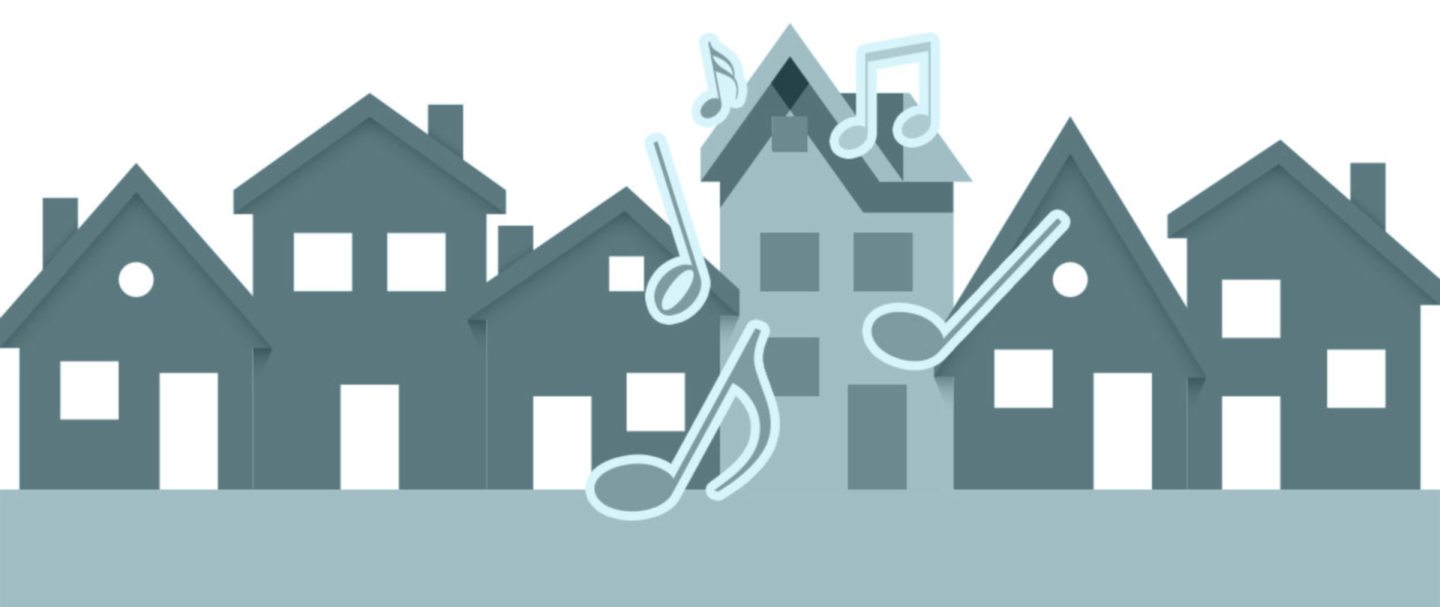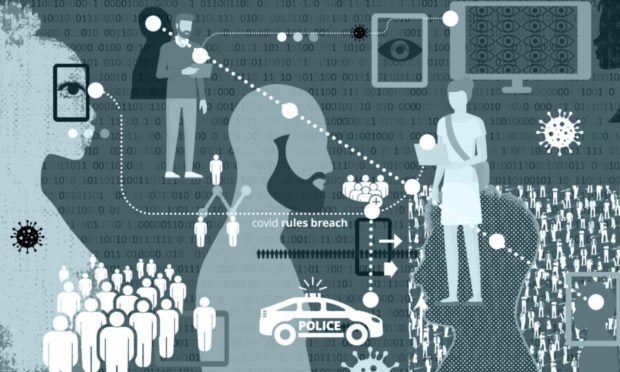With coronavirus restrictions easing we looked at the enforcement data over the past year and how the pandemic has been policed in your area.
Exclusive information received through a freedom of information request has also revealed tens of thousands of reporting forms have been filled out by Scottish residents warning police of Covid-19 breaches.
What is a Covid-19 crime?
A new law called the Coronavirus (Scotland) Act 2020 received Royal Assent on April 6 last year, in a response to the pandemic.
Under the legislation, Police Scotland was given powers in order to help manage the spread of Covid-19.
Officers are able to use the powers to deal with situations if people do not comply with social distancing restrictions, or “requests to undergo screening and assessment, or requests to self-isolate”.
In enforcing Covid-19 restrictions, police will engage with individuals, asking if they are aware of the restrictions, establishing individual circumstances and find out how quickly someone can comply with regulations. They will also explain the risks to public health and encourage voluntary compliance.
If a person still does not comply, they can enforce the act.
Since the end of March last year, officers have been recording coronavirus enforcement that has taken place, from those who were asked to move on, to people who have been arrested for breaching Covid-19 restrictions.
Over the past year, Police Scotland has been publishing its enforcement data which can be broken down by date, type of enforcement, police division area and area command.
However, all of the data is reliant on officers manually recording any enforcement, and true figures may be higher.
When are crimes being committed?
Looking at the average number of enforcement actions by day of the week, Friday was generally the busiest day for police with an average of 15, with only slight variation across the different types of enforcement.
Figures released by the Scottish Government show crimes recorded related to coronavirus have fallen in the past year. In May 2020, there was 1,654 crimes recorded, compared to 1,434 in May 2021 – a drop of 13%.
The number of crimes committed reduced following the first lockdown of 2020, however have been increasing since August last year, peaking in February, with 4,199 recorded crimes. They are now decreasing again.
The lowest number of recorded crimes was recorded in July 2020 at 17.
A similar trend has been recorded throughout 2021, with the number of people arrested increasing at the start of the year compared to last year’s levels.
Arrests peaked on March 6, 2021, when 18 arrests were made – the day that Rangers fans celebrated their Premiership win.
From January 1 to June 30, there was 438 arrests for Covid-19 related crimes, compared to 533 for the whole of 2020 across Scotland.
This means more than 80% of all arrests for breaches of coronavirus regulations last year has already taken place in the first six months of the year. (82.18%)
The highest number of arrests took place in April 2020, as lockdown began, with 146 people arrested that month. The second highest month was February this year with 119 arrests made.
Covid-19 reporting form

In December, Police Scotland introduced a Covid-19 crime reporting form, which meant that people could go online and alert officers to people, groups or businesses breaching coronavirus regulations. It also allows people to report any Covid-19-related frauds.
Each form that is submitted is reviewed and assessed by Police Scotland service centres to identify what, if any, police response is required.
Those who fill out the form are asked whether the breach is occurring in Scotland, and whether it is currently happening. Once these have been established, it asks the person filling it out who it involves – a business, a group of people, an individual or a fraud or scam.
If a group of people is selected, users can choose how many people are included, from 2-6 people, 7-30 people or more than 30.
Under businesses, users are asked whether it is a pub, bar, club or restaurant and whether face coverings are being worn.
If fraud or scam is selected, people are advised that if a business, charity or organisation is currently under cyber attack with data potentially at risk to call 999.
Information obtained by the DC Thomson data team shows that between December 2, 2020 and May 18 this year, a total of 28,507 forms were filled out.
Breakdowns of type of form were disclosed from February 16.
From February 16 to May 19, 1,222 forms were lodged against businesses, and 19 were to do with reporting fraud.
The largest number of forms were submitted about groups of people – a total of 12,604.
In addition to this, a further 1,236 were filled out about individuals.
A meeting of the Scottish Police Authority Independent Advisory Group on coronavirus powers held at the start of June stated that there had also begun to be an increase in online reporting, expected to be tied to good weather.
Minutes of the meeting stated: “Changes highlighted were an increase in online reporting and an increase in work for C3, which may have been related to good weather and restrictions easing. The group heard some reports through online reporting related to incidents which were not actual breaches as the numbers were within recently increased limits for gatherings.”
Superintendent Dave Ross said: “An online form is already available to allow the public to report lower level complaints and help ease the demand on our 101 and 999 services, particularly during the summer months which are the busiest for our control rooms.
People shouldn’t have to call about their neighbours because everyone should be taking responsibility to do the right thing to help stop the spread of coronavirus.”
Superintendent Dave Ross
“A separate form was also introduced to allow people to report ongoing breaches of coronavirus regulations in Scotland which we have found extremely beneficial and had good engagement from the public.
“We would always encourage anyone to contact the police if they have concerns that someone is breaking the law, but people shouldn’t have to do that. People shouldn’t have to call about their neighbours because everyone should be taking responsibility to do the right thing to help stop the spread of coronavirus.”
Police Scotland declined to give a localised breakdown by form, or how many of the forms were actioned on, on the basis that it would exceed the cost of a freedom of information request.
Where are Covid-19 crimes being recorded the most?
The north-east had some of the lowest levels of enforcement action in the country across the whole pandemic.
In the North East Division, which covers Aberdeen, Aberdeenshire and Moray, the most enforcement actions were taken on September 18, 2020, with 335 recorded.
On this date, 171 people were asked or informed about Covid-19 breaches, while a further 120 were warned they were breaching the rules in Aberdeen North, with a further 20 people in Aberdeenshire South asked or informed about Covid-19 breaches, and another 20 warned.
Four people in Moray were also asked/informed.
In the Highlands Division, covering Inverness, Shetland, north and South Highlands, Orkney and Western Isles, the busiest day for enforcement actions was January 2, 2021, with 270 recorded.
This was the result of 128 people being asked/informed about Covid breaches and 128 warnings issued in the South Highlands. Additionally, seven were asked/informed in North Highlands while three were warned/instructed and three asked/informed in Inverness.
Approaches to Covid law enforcement
The police have a variety of options at their disposal when dealing with Covid breaches ranging from a member of the public obliging to being ‘asked/informed’ to move along (the most common action), to an arrest taking place (less frequent). Over time, some police divisions have varied their approach.
In the north-east, the highest rate of FPNs were issued in May 2021, at 22% of 263 total enforcement actions.
In the same month, there was a high rate of removals by police, at 27% (70 incidents).
In contrast, 98% of enforcement actions in June 2020, and 100% in July 2020, were ‘asked/informed’ in the same area.
During these summer months lower levels of restrictions were in place and a low number of overall enforcement actions were taken by police: 63 in June and 50 in July 2020.
In the Highlands, the highest rate of arrests was right at the beginning of the first lockdown in April 2020 – at 15 out of 1095 enforcement actions (1.4%).
November 2020, when the tiered restriction system came into force, was the next crackdown by police with 19 FPNs issued, a rate of 6%. However, the month with the highest rate of fines was February 2021 when police issued 41 penalty charges, at 18% of the total 233 enforcement actions taken that month.
June 2020 was the Highlands’ busiest month – with 1,131 enforcement actions taken. Restrictions were relaxed at this point – 1,030 (91%) of those actions were ‘asked/informed’.
Difference in methods
In May’s meeting of the Independent Advisory Group, which was set up to scrutinise Police Scotland’s use of coronavirus powers, the difference between police force methods was discussed.
Minutes from the meeting state: “John Scott reflected on the use of social media by police forces, citing the events in George Square, Glasgow, as a positive example of using social media to provide communications.
“ACC Ritchie (ACC Gary Ritchie of Police Scotland) sought comment on the challenge of consistency across various police forces in policing the regulations. The group heard that research showed that communication on regulations could be somewhat diluted by the time it reached front line officers. It was possible therefore that, especially with the frequency of changes, national regulations could be interpreted differently by different forces.”
Meanwhile, in June’s meeting, it was discussed that decreases in police interventions may be linked to there being less rules to break, and “the use of officer discretion as regulations changed and relaxed.”
House parties and Covid laws

Police officers have also been cracking down on house parties as part of its enforcement actions in the past year.
A freedom of information request revealed that across Scotland, officers have been called to 3,881 house gatherings breaching restrictions, and have been called to 6,598 gatherings.
In the north-east, the day with the highest number of house gatherings in breach of Covid-19 regulations was February 12, where 12 breaches were attended by officers.
There was a further 11, the second highest number, on March 21, followed by 10 on February 27.
From January 5 to April 26, there were 306 house parties in breach of regulations, with officers being called to attend 634 gatherings.
In the region, 237 FPNs were issued, and 80 arrests were made.
On February 8 officers attend the most house gatherings in breach of Covid-19 regulations, at eight.
The second highest day was recorded on March 20, with seven.
In the Highlands and islands area, there were 126 house gatherings found to be in breach from January 5 to April 26, with 88 FPNs given out and 13 arrests made. A total of 207 gatherings were attended.
Assistant Chief Constable Alan Speirs said: “Our approach throughout the pandemic has not changed. Officers will engage with the public, explain the legislation and encourage compliance, but will not hesitate to use enforcement as a last resort.
“We have detected ‘spikes’ in enforcement activity and this can usually be linked to specific issues, such as large numbers of people breaching regulations at public parks, attending illegal gatherings or house parties, but our approach has not changed.
“This approach will remain as, hopefully, restrictions continue to be eased over the coming months and we move back to a more normal way of life.
“A recent interim report from the Independent Advisory Group to examine our response to the pandemic, and chaired by leading human rights lawyer John Scott QC, found that our use of emergency powers remains compliant – both in application and spirit – with our values of integrity, fairness, respect and a commitment to upholding human rights.”
In April 2020, it was announced that an Independent Advisory Group, chaired by John Scott QC, would be set up, reporting directly to the Scottish Police Authority.
Its purpose was to review Police Scotland’s use of the powers to tackle coronavirus, with any urgent actions identified by the group to be implemented as necessary.
All of the data from this story can be found here.
More from the data team
-
Coronavirus in Scotland – track the spread in these charts and maps
-
Covid vaccine in Scotland: Track the rollout progress with these charts
-
Coronavirus in Scotland – here are the key demographics

